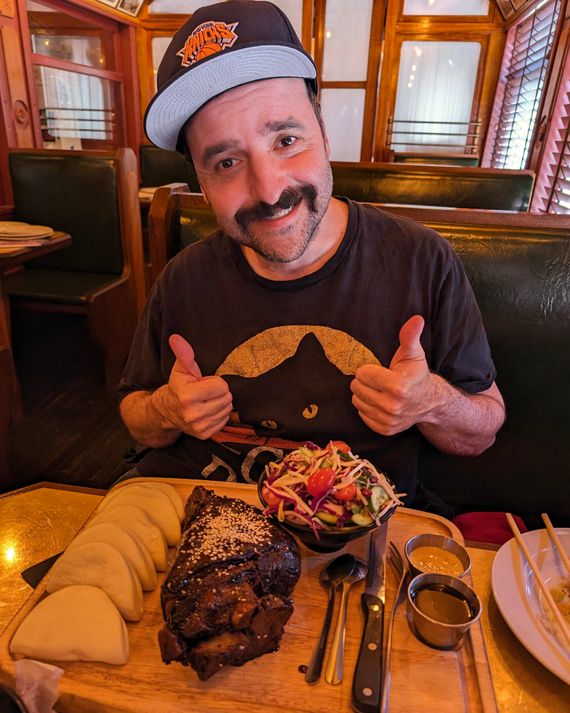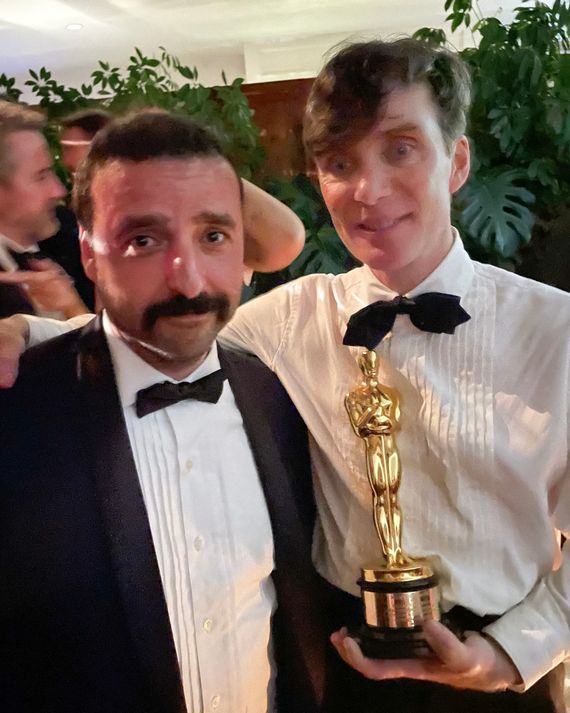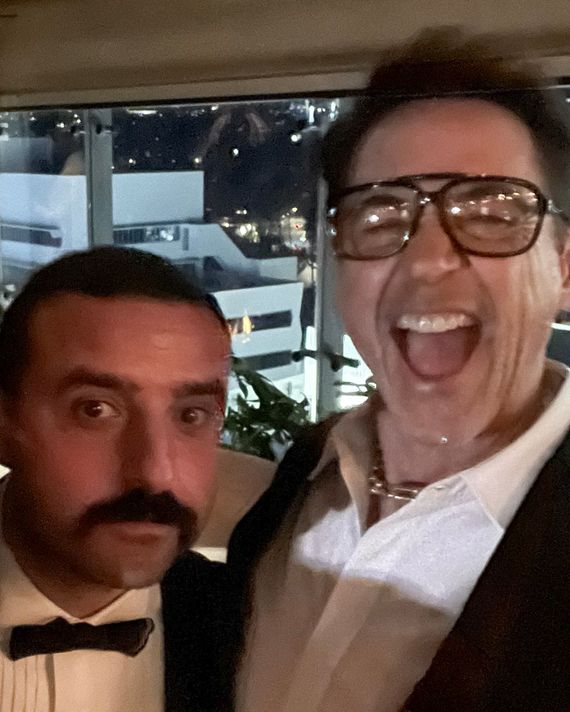
In the town where I grew up, there was a farm that purported to feature the biggest pig in the world. It was the size of a small minivan, and few had ever seen it awake. I often wonder what happened to that pig, but now I may have an answer: He donated his body to become lunch for the actor David Krumholtz.
Even the luckiest actors have lean years amid the fat, but on the Monday after the Oscars, Krumholtz is enjoying a period of abundance. Oppenheimer, in which he plays the menschy physicist Isidor Rabi, cleaned up the night before, winning seven trophies including Best Picture. A few weeks later, Lousy Carter, an indie comedy where the actor stars as a dyspeptic literature professor, will hit theaters. (The New York Times calls it “repellently watchable.”) “You spend a lot of awards seasons watching from your couch, thinking, Those sons of bitches. When am I going to get my chance?,” Krumholtz says. “And then it happens, and it’s almost too much. I don’t know if I prefer the couch.”
Today Krumholtz is clad in a Knicks hat and Mario mustache; the latter for a role, the former because he’s from Queens. He is also starving. “I barely ate last night,” he says. “You run around like a nutcase.” We’re at the Formosa Cafe on Santa Monica Boulevard, a landmark Chinese restaurant that dates back to the Golden Age of Hollywood. Sinatra drank here, as did Bogey, Elvis, and John Wayne. The plan was to commemorate Oppenheimer’s big night by communing with the ghosts of Los Angeles past, but fate has a more literal metaphor in store.
They say that when you ask for what you want, the universe provides. Sometimes it provides too much. Krumholtz eschews the $24 lunchbox deal — “I’m going to get whatever the fuck I want” — in favor of the spicy wok-fried rice with chicken and the Chinese barbecue pork. This proves a mistake. The rice arrives on a platter the size of a vinyl record, piled high in portions that recall Scarface. The pork can trace its origins to some prehistoric behemoth. It’s bigger than either of our heads, lacquered to a deep mahogany. In loyal attendance are a half-dozen bao buns and a heaping bowl of salad. It is the Oppenheimer of food orders: a gargantuan artistic feat that requires special technology (in this case a second table) to be properly exhibited. “Oh God almighty, what did I do?” Krumholtz says.
Krumholtz has often had a lot on his plate. He entered show business as a child actor, usually playing some form of nerd: a nerdy camper in Addams Family Values, a nerd who recited Shakespeare in 10 Things I Hate About You, a former nerd who’d grown up and gotten cool in Freaks and Geeks. (He was also Bernard the Elf, a seasoned professional, in the Santa Clause movies.) Then suddenly, in the 2000s, nerds weren’t just cool; they were hot. In 2005, Krumholtz landed a starring role in CBS’s Numb3rs, where he pouted his way through six seasons as a hunky mathematician. The show was canceled in 2010. A year later, he was diagnosed with thyroid cancer. When his thyroid was removed, “I just ballooned,” he says. He wasn’t one of those actors who dreamed of staying sexy forever — “That’d be gross” — but the scourge of before-and-after shots did make him wish he’d never been hot in the first place.
Now in his 40s, Krumholtz has become a character actor. You might have seen him as a member of an underground communist cell in Hail, Caesar!, or as a porno director who shows Maggie Gyllenhaal the ropes in The Deuce. His greatest asset may be his eyes: When he turns them on, his hangdog expression exudes wry humor and a surprising warmth. In Oppenheimer, Krumholtz’s Rabi functions as the audience surrogate. He’s the hero’s trusted confidant, providing an earthiness that cuts through the theory. Nevertheless, Krumholtz was not included when the film won Best Cast at the SAG Awards, which only goes to those with solo title cards. And he was not invited to the Oscars.
The life of a character actor requires a lot of humility and a healthy knack for self-deprecation. “When Cillian Murphy shows up at parties, they walkie-talkie to each other, ‘The eagle has landed.’ When I show up, they say, ‘The roach is here,’” he says. “I feel like people see me coming and go, ‘That cannot be an actor.’” Since he deliberately cultivates a sense of ordinariness, he says, “I’m not offended by it at all.”
Still, after 30 years in the business, he knew he might never get another Oscar season. “I was panicking a little bit,” he says. “All the anticipation: How will I feel? And when you win, you don’t want to miss a beat. You want to soak it up.” On the big night, Krumholtz rented a tux, watched the Oscar telecast from the Universal party at Soho House, then hit up a few after-parties. Over the urinal, he met a 27-year-old doctor. “I said, ‘I’m in Oppenheimer, we just won everything.’ He said, ‘In that case you get free Botox from my office.’ And I thought, I should probably go.” He was home by 11:15, with one new Instagram follower.


Though Krumholtz spent his formative years in Los Angeles, he does not live there anymore. “Being in L.A. has become excruciating,” he says. “There are memories around every corner, ghosts of my past.” He left town in the early ‘10s, after a period he considers his personal and professional nadir. Krumholtz had not come from wealth; his father was a mailman. The Numb3rs gig brought more money than he had ever dreamed of. He spent it like a madman. “I was that guy,” he says. “I’d go to super-fancy French restaurants and order the $6,000 bottle of wine. I paid for my own wedding at the Plaza Hotel, a quarter of a million dollars.” He bought a house in the Hollywood Hills, down the street from Kanye West’s. It had four stories and an elevator, and it was a disaster. “The roof started leaking as soon as we moved in. The elevator broke and cost $11,000 to replace. My friends were making fun of me. I got foreclosed on, short sale. I lost half a million dollars. You start looking at your house going, I am my house. I’m crumbling.”
It wasn’t just the house. For a brief time Numb3rs put him on the map, and he felt he hadn’t been able to capitalize. In 2006, Krumholtz landed the lead role in Woody Allen’s Midnight in Paris, which led him to drop out of playing one of the stoners in Knocked Up. But labor riots in France caused Paris to lose financing, and that version of the project fell apart. (He’d later appear in Allen’s Wonder Wheel, which he now says he regrets.) Months later, Quentin Tarantino called to ask if Krumholtz was available for Inglourious Basterds. His Numb3rs commitments made it impossible. “You just know at that moment those opportunities are never going to come again.”
The next year one of his close friends, Seth Rogen, became terrifyingly famous. “In my friend group, there were six of us, then suddenly there were like 80 of us,” he says. He remembers attending a concert at the Hollywood Bowl with Rogen the weekend Knocked Up came out; within seconds they were surrounded by a huge mob of strangers. The moment stuck with him. “Seth is one of the toughest people I know. But I saw a fear in his eyes that I’d never seen before. And I thought, The first rush of fame is fear.”
Soon after, another friend, Heath Ledger, died, as did Krumholtz’s Sidewalks of New York co-star Brittany Murphy. “It was madness,” he says. “Like, wow — I’m in Hollywood where people die of drug overdoses, and friends become wildly famous, and there’s missed opportunities. It was a really hard time.”
All of this coincided with the calls slowing down. In Hollywood, there’s no avoiding “the mire of the ego swamp that gets created within you while you’re here,” he says. “But at a certain point, I became embarrassed by myself.” He decided to leave. “When you work in L.A., the sun shines brighter. Adversely, when you’re out of work and searching, the town gets dim. Because everywhere you go, you’re reminded of what you’re not working on.” Krumholtz is now a proud resident of New Jersey, where “the billboards are for plumbers and injury lawyers.” While appearing in Leopoldstadt on Broadway in 2022, he drove to the theater every day, a journey he swears took only 37 minutes. “And I never hit traffic, not once, in 195 performances.”
Krumholtz used to turn down interview requests, thinking it would create a mystique. Eventually he realized he was suffering from an affliction that hurts many character actors. While people knew him from individual roles, “they never connected the dots” to his entire body of work. He has a sense that Oppenheimer may have inched the door slightly open again, and for Lousy Carter, he’s ready to put himself out there. “Thirty-two years, 51 movies in, I think it’s time I stand and be counted a bit.”
His recent forays on the website formerly known as Twitter likely helped on this front. At the same time Oppenheimer was dominating awards season in February, Krumholtz published a series of wildly popular threads revealing untold stories from his years in the business. They felt the way Twitter used to feel — funny, filthy, and dishy. (One highlight: the story of the time he puked all over himself after doing shots with Crazy Town in Cancun, jeopardizing his appearance opposite Jerry Springer on MTV’s Say What Karaoke.) Some of them got dark. His final thread was a miniature essay explaining that “an actor’s product is their self,” leaving many in his profession “shells of themselves hiding within the shells of others.”
Krumholtz wrote that thread at home, in bed. “I have moments where … it’s not even depression, I just get scared — of never working again, none of it mattering, it all being meaningless. I had been tweeting funny stories, and I thought, Let’s give people a dose of reality.” This thread went as viral as the others, and spurred a fresh round of media interest. Yet once again, Krumholtz took stock of himself, and didn’t like what he saw. “I realized I couldn’t wait for people to respond.” He realized he was indulging in “that old knee-jerk ego response: ‘Pay attention to me, please.’” He deleted his public account, though he retains a secret handle that he uses to lurk.
He still believes what he wrote, though. “I don’t know what acting is. I don’t think it’s an art form. It’s not easy, but it looks easy,” he says. “The hardest part is getting out of your own way, of thinking, How will this be received?”
For Krumholtz, this wisdom was first paid for in the death of his father. “I needed to have my heart broken,” he says. Krumholtz was his father’s caretaker at the very end. “Witnessing the strength he went out with, it just lit a fire under my ass.” But it took his Deuce co-star Maggie Gyllenhaal to teach him how to act free of expectations. “I was angry, and I thought, I’ll use this. But Maggie’s style is, ‘Let’s just feel something. Let’s not make any rules.’ Suddenly, for the first time in my career, I didn’t see the camera anymore.”
Krumholtz hasn’t fully given up caring about how his performances will be received. A few years ago he began turning down overtly Jewish roles, fearing he would be stuck playing a rabbi for the next 30 years. But Lousy Carter, a film as small as Oppenheimer is big, is a demonstration of the type of performance an un-self-conscious actor can give. It’s 75 minutes long and was shot in 15 days, with Krumholtz making $100 a day, the SAG minimum. He plays a college professor who learns he only has six months to live — but rather than take the opportunity to become a better person, Krumholtz’s Lousy embraces his own worst self. “I said, ‘He should be totally relieved that he’s dying, and that’s how I want to play it.’ He’s happier than he’s ever been.”
If that’s not quite Krumholtz, then at least he’s happy in his unhappiness. For a long time, he was ashamed about never feeling satisfied. Why couldn’t he just look back on the work he’d done in the past and be content? “Only recently have I gone, No, you’ll never be able to do that. I need to think that I have the potential to be something special. I feel like I owe it to the spirits of the people who are no longer here to be awesome. I want to be doing this when I’m 90.”
In one of those strange wire-crossing moments Los Angeles occasionally provides, our feast is interrupted by none other than Annie Lennox and her husband. “Legends walk among us,” Krumholtz whispers. As they sit down at the booth behind us, he gets up to thank the former Eurythmic for calling for a cease-fire in Gaza. “I’m not going to bother you, but I’m Jewish, and I really appreciate everything you said about the conflict.”
“I’ve always wanted peace for everyone,” Lennox says.
Thirty minutes later, they’re leaving. Lennox’s husband pauses at our table. He couldn’t help but overhear, he tells Krumholtz. “If you won an award last night, congratulations.”


